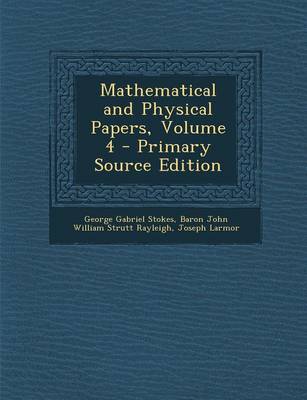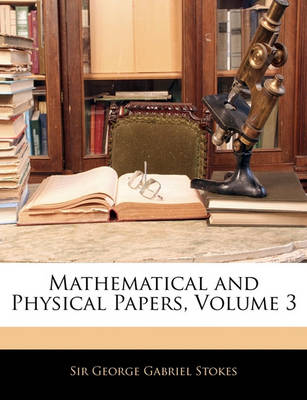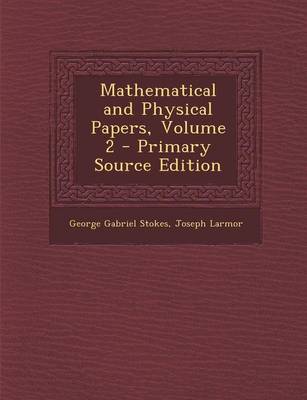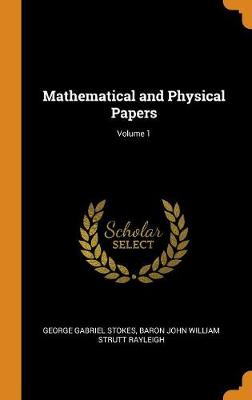Cambridge Library Collection - Mathematics
5 total works
Mathematical and Physical Papers, Volume 4
by George Gabriel Stokes, Baron John William Strutt Rayleigh, and Joseph Larmor
Published 6 January 2010
Sir George Stokes (1819-1903) established the science of hydrodynamics with his law of viscosity describing the velocity of a small sphere through a viscous fluid. He published no books, but was a prolific lecturer and writer of papers for the Royal Society, the British Association for the Advancement of Science, the Victoria Institute and other mathematical and scientific institutions. These collected papers (issued between 1880 and 1905) are therefore the only readily available record of the work of an outstanding and influential mathematician, who was Lucasian Professor of Mathematics in Cambridge for over fifty years, Master of Pembroke College, President of the Royal Society (1885-1890), Associate Secretary of the Royal Commission on the University of Cambridge and a Member of Parliament for the University.
Sir George Stokes (1819-1903) established the science of hydrodynamics with his law of viscosity describing the velocity of a small sphere through a viscous fluid. He published no books, but was a prolific lecturer and writer of papers for the Royal Society, the British Association for the Advancement of Science, the Victoria Institute and other mathematical and scientific institutions. These collected papers (issued between 1880 and 1905) are therefore the only readily available record of the work of an outstanding and influential mathematician, who was Lucasian Professor of Mathematics in Cambridge for over fifty years, Master of Pembroke College, President of the Royal Society (1885-1890), Associate Secretary of the Royal Commission on the University of Cambridge and a Member of Parliament for the University.
Mathematical and Physical Papers, Volume 2
by George Gabriel Stokes and Joseph Larmor
Published 2 January 2010
Sir George Stokes (1819-1903) established the science of hydrodynamics with his law of viscosity describing the velocity of a small sphere through a viscous fluid. He published no books, but was a prolific lecturer and writer of papers for the Royal Society, the British Association for the Advancement of Science, the Victoria Institute and other mathematical and scientific institutions. These collected papers (issued between 1880 and 1905) are therefore the only readily available record of the work of an outstanding and influential mathematician, who was Lucasian Professor of Mathematics in Cambridge for over fifty years, Master of Pembroke College, President of the Royal Society (1885-1890), Associate Secretary of the Royal Commission on the University of Cambridge and a Member of Parliament for the University.
Mathematical and Physical Papers; Volume 1
by George Gabriel Stokes and Baron John William Strutt Rayleigh
Published 9 March 2010
Sir George Stokes (1819-1903) established the science of hydrodynamics with his law of viscosity describing the velocity of a small sphere through a viscous fluid. He published no books, but was a prolific lecturer and writer of papers for the Royal Society, the British Association for the Advancement of Science, the Victoria Institute and other mathematical and scientific institutions. These collected papers (issued between 1880 and 1905) are therefore the only readily available record of the work of an outstanding and influential mathematician, who was Lucasian Professor of Mathematics in Cambridge for over fifty years, Master of Pembroke College, President of the Royal Society (1885-1890), Associate Secretary of the Royal Commission on the University of Cambridge and a Member of Parliament for the University.
Sir George Stokes (1819-1903) established the science of hydrodynamics with his law of viscosity describing the velocity of a small sphere through a viscous fluid. He published no books, but was a prolific lecturer and writer of papers for the Royal Society, the British Association for the Advancement of Science, the Victoria Institute and other mathematical and scientific institutions. These collected papers (issued between 1880 and 1905) are therefore the only readily available record of the work of an outstanding and influential mathematician, who was Lucasian Professor of Mathematics in Cambridge for over fifty years, Master of Pembroke College, President of the Royal Society (1885-1890), Associate Secretary of the Royal Commission on the University of Cambridge and a Member of Parliament for the University.




